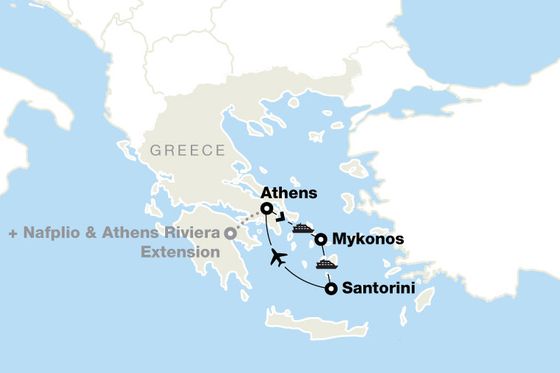
The EF Go Ahead Tours Traveler Index: a sentiment review of international travelers from the United States and Canada
To travel or not to travel: That is the question. Not to sound too Shakespearean about the recent state of the world, but it seems a lot of geopolitical and economic events are certainly causing American and Canadian consumers to be more deliberate when it comes to making discretionary purchases—be it a new car that might be impacted by tariff price increases or that bucket list trip to Paris.
With the current state of the economy (which seems to swing up and down like a seesaw based on the day), is now the time to travel? How will Americans be treated when they go abroad? And what exactly do travelers hope to get out of the experience when traveling to parts unknown?
EF Go Ahead Tours decided to ask older millennial, Gen X, and Baby Boomer travelers (ages 35+) from the United States and Canada about their interests in international travel, where they hoped to visit, and what they hoped to get out of the experience when exploring the world. In the first edition of The EF Go Ahead Traveler Index, more than 1,000 travelers were surveyed about their interests and intentions to travel in the next 12 to 24 months. Some high-level findings found that:
The uncertain economy is still a driving force in travel purchase decisions amongst consumers in America and Canada, but deal seekers are hunting for value.
- 64% of travel bookers are motivated by significant discounts available for off-peak tour opportunities.
Despite the headlines, the vast majority of American and Canadian travelers report positive experiences when recently traveling to international destinations, inclusive of Europe, Latin America, Asia, Africa, etc.
- 70% of Americans who traveled internationally since January 2025 felt welcomed by locals.
Solo travel is still booming as more Americans and Canadians seek out community, connection, and flexibility when immersing themselves into local culture.
- 35% said they wanted to meet new people and make new connections when traveling solo.
Climate change is influencing the way Americans and Canadians explore the world from June-August.
- 69% of travelers are interested in cooler international climates for summer travel.
- 89% of travelers say they are increasingly prioritizing sustainable travel choices.
Passions for life-long learning intersect with wanderlust when it comes to international travel.
- 59% of retired survey respondents are worried about keeping their minds active and challenged as they age, viewing travel as an important wellness strategy for cognitive health.
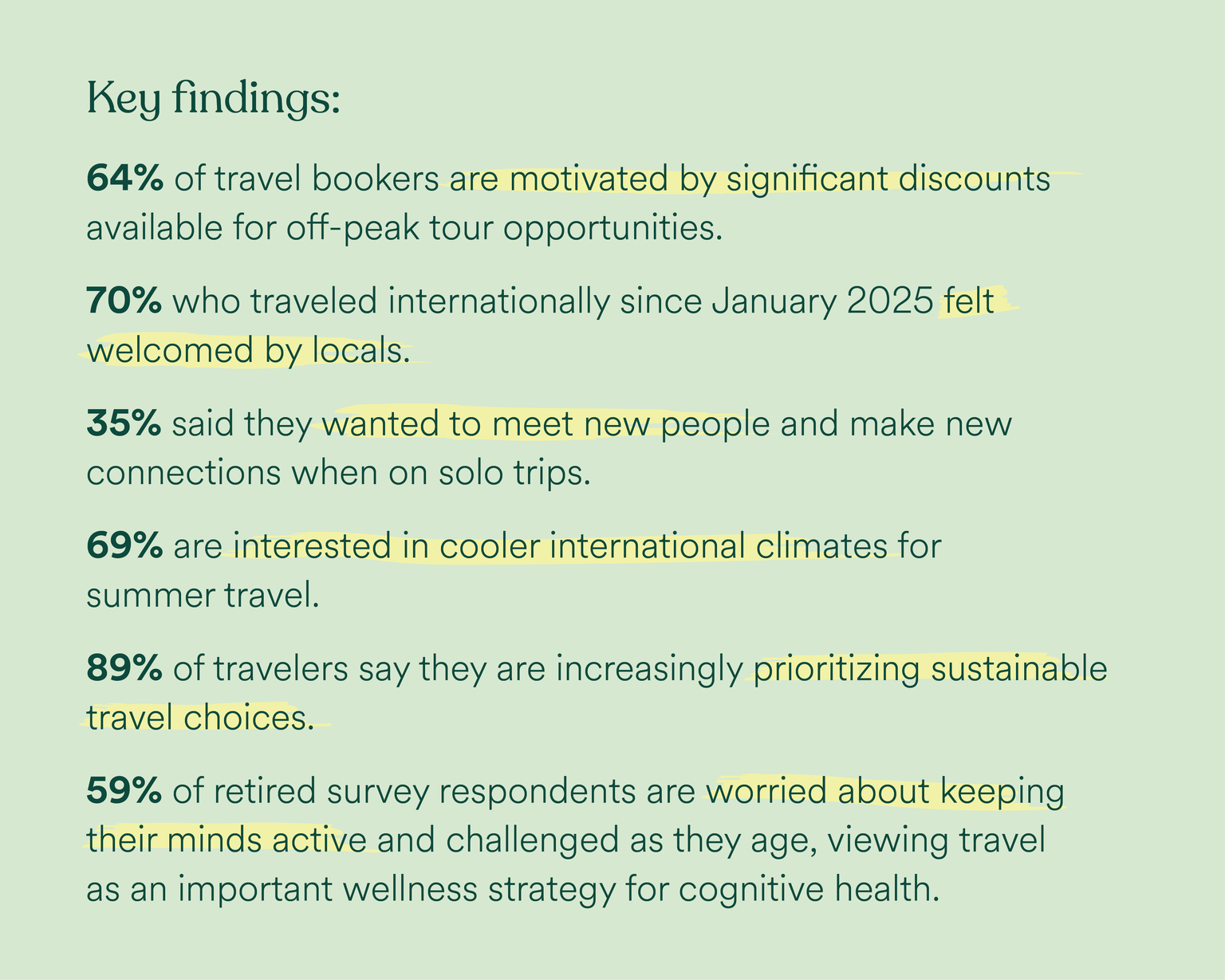
Tourism demand: indicators during turbulent economic times
Despite the fact that 47% of survey respondents (at the time of the survey in May 2025) had already traveled internationally since January 2025, future travel bookings appear to be under new levels of scrutiny even if the intent to travel remains high.
A large majority (74%) of travelers either somewhat or strongly agree with the realities of travel costs competing with other discretionary purchases. More than half of those surveyed (51%) somewhat or strongly agree that economic uncertainty is causing them to reconsider their travel plans.
That’s the bad news. The good news?
More than 81% of American and Canadian travelers ages 35+ told EF Go Ahead Tours that they still intended to travel internationally into 2026, with 54% still planning 2025 travel, and 27% already committed to travel in 2026.
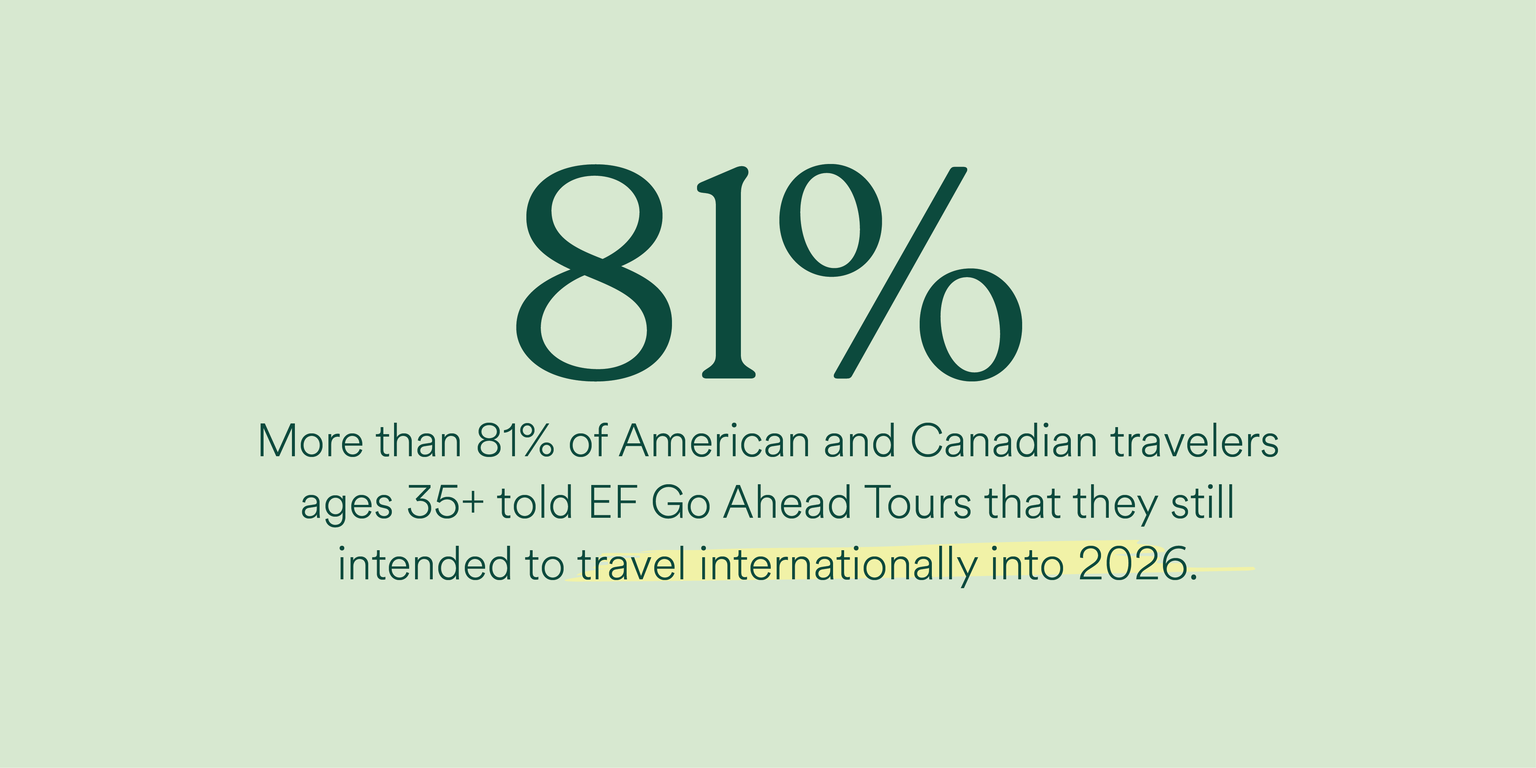
In terms of level of frequency, in the next 12-24 months, two in 10 American and Canadian consumers (21%) said they plan to travel more than they did during the previous two years, with 65% saying they expected to travel about the same amount. Only 14% said they expected to travel less during this same period.
Where are they going? If travelers were to book trips outside the United States and Canada, these destinations rank from highest to lowest in terms of demand.
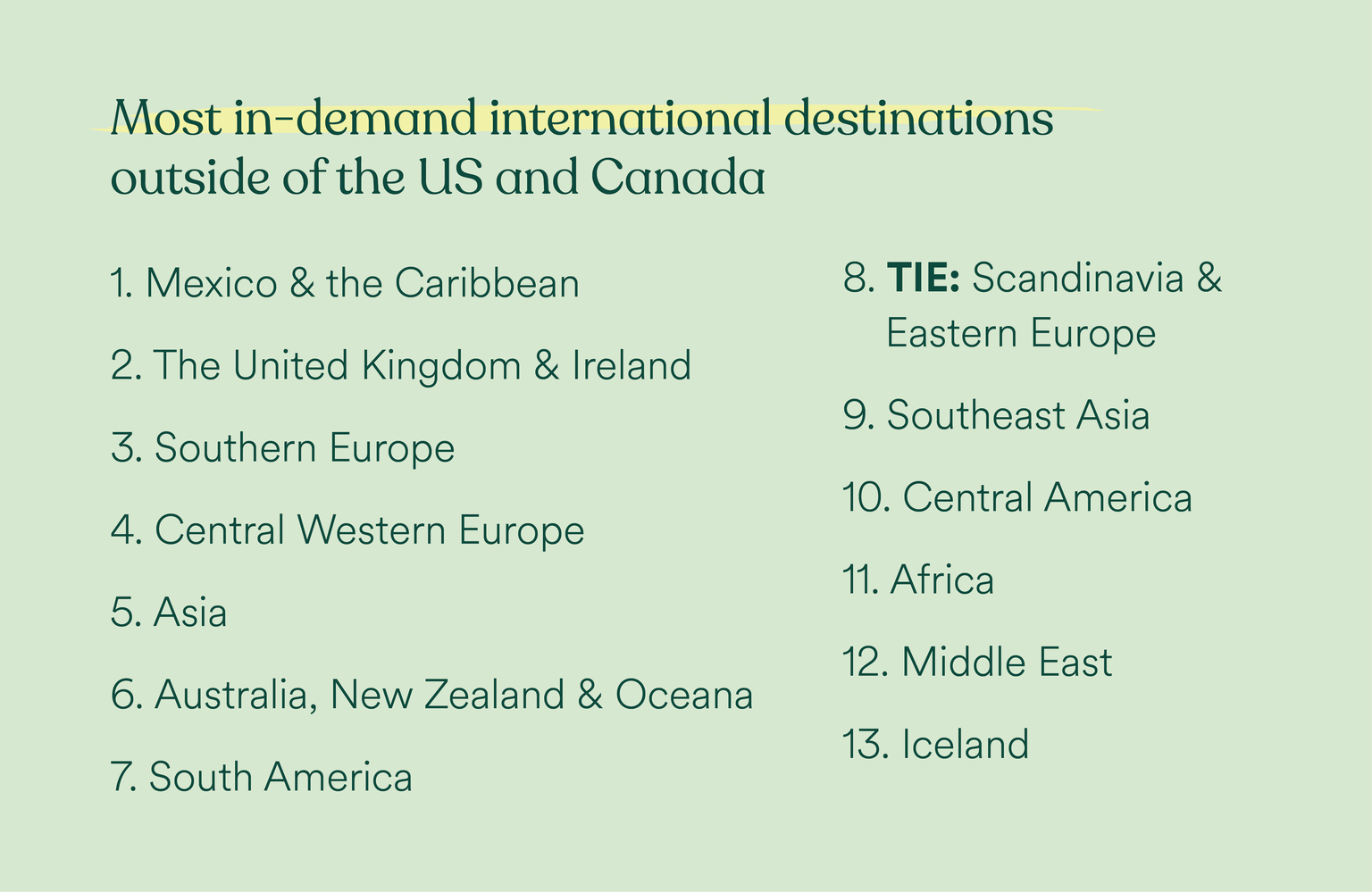
The top three U.S. destinations that travelers wanted to visit (and hadn’t traveled to yet) were: Hawaii, Alaska, and the National Parks within the United States (inclusive of Yellowstone, Yosemite, the Grand Canyon, etc).
Why have so many travelers in North America held back on their domestic travel dreams? The number one reason: higher cost compared to other destinations.
Cultural polarization and the impact on travel
Wanna get away?
Nearly four in 10 U.S. and Canadian travelers surveyed (37%) said that because of current public policies or legislative action in their home countries, they were more likely to travel internationally outside the United States.
When Canadian residents were asked where they intended to travel abroad, only 13% said they intended to travel in the United States over the next 12-24 months. 65% of Canadians said they intended to travel in “Rest of World” with 22% saying they would vacation within the borders of their resident country.

Nearly half of U.S. residents surveyed (48%) said that they were more likely to travel internationally given the current political climate.
A silver lining?
Despite news headlines of Americans fearing how they would be treated abroad, 70% of those surveyed who traveled internationally since January 2025 felt welcomed by locals. Despite the politics of the day, Americans reported still feeling comfortable traveling to destinations like Mexico and the Caribbean, the United Kingdom and Ireland, and much of mainland Europe (Central, Southern and Eastern Europe).

Is off-peak Europe the new sweet spot for international travel?
Travelers are hunting for bargains, especially off-peak deals, to make their international travel dreams a reality.
With off-peak travel in Europe gaining popularity from November-March, more than six in 10 travelers (64%) said that significant discounts (of 30% or more) would incentivize them to book now.
Italy ranks number one on the list of European destinations travelers would visit off-peak followed by Spain and Portugal, Greece, the U.K. and Ireland, then trips to enjoy the Christmas markets of Central Europe, and the Alpine landscapes and winter cuisine of France.
Nearly half of off-peak travelers headed to Europe (48%) said they plan to stick to the action of cities over countryside destinations.

Other than steep discounts, what’s so attractive about off-peak Europe?
- 57% said fewer crowds at attractions and major landmarks.
- 42% said exclusive access to attractions or experiences that are typically overcrowded.
- 36% said special seasonal experiences that are unavailable during peak times (winter festivals, Christmas markets, etc).
- 35% said more authentic interactions with locals and daily life.
Travelers’ biggest worry when it comes to booking off-peak? Hey, you can’t control the weather! 54% of travelers worry about weather disruptions and more than five in 10 (53%) are worried about “unpleasant conditions.”
And while some might fear the cold of Europe during off-peak, many more American and Canadian travelers seem more worried about vacation in the blistering heat of summer.
Chasing a coolcation?
More than half of older Millennial, Gen X, and Baby Boomer American and Canadian travelers (53%) told EF Go Ahead Tours that extreme summer heat was influencing their international travel plans.
Nearly seven in 10 travelers (69%) said they would be interested in traveling to a destination with cooler temperatures from June-August. 77% of travelers said the perfect vacation temperature locally during this period was from 60–80-degrees Fahrenheit (16-27-degrees Celsius), with one in 10 travelers saying 40-50 F (5-16 C) was ideal!

The top three coolcation destinations favored include: The Rocky Mountains (United States and Canada), the Nordics (Denmark, Sweden, Norway and Finland), and Australia or New Zealand (which are in the Southern Hemisphere and experiencing winter from June-August).
The top turn offs of extreme heat for all U.S. and Canadian travelers?
- 60% said extreme heat limits outdoor levels of activity.
- 37% of travelers said they have a strong dislike when it comes to “sweating” with 26% worried about the lack of quality air conditioning in hotels outside the U.S.
- 28% said they worried about experiencing “heat exhaustion.”
The solo surge continues
The love of community and connection continues to drive solo travel bookings at EF Go Ahead Tours, up 16% year-over-year since June 2024. Some of the big drivers of solo travel include:
- 46% of solo travelers surveyed said they valued the freedom to create their own schedule when traveling.
- For those booking with tour operators, 47% of solo travelers said they valued smaller group sizes.
- 35% said they wanted to meet new people and make new connections when on solo trips.
- 29% said solo travel was about personal growth and self-discovery. - And for 26%, solo travel is simply a confidence boost when navigating the unfamiliar.
The two biggest months for Solo Tour departures at EF Go Ahead Tours? October and April!

More sustainable travel is the norm
Travelers of all ages are simply more aware of the impact of climate change and the impact the travel industry is having on sustainability. This is just as true for older millennials, Gen X, and Baby Boomers, even if Gen Z seems to be the most in tune with the impact of our actions on the planet.
Only one in 10 U.S. and Canadian travelers ages 35+ (11%) said that traveling sustainably was not important to them. More than three in 10 (35%) said that sustainable travel was very or extremely important.
Putting their money where their sustainable mouth is, more than half of these travelers (52%) said they would be willing to pay more to travel with a company that demonstrates it is operating in a manner deemed to be “environmentally responsible.”
So have faith, as there just might be hope for the planet yet!
Have food, will travel
When it comes to one of the biggest motivators of traveling the world, one motivator rises above all—food.
Food might be one of the most appreciated benefits of travel amongst travelers and a way to learn more about local cultures.
Nearly half of all U.S. and Canadian travelers ages 35+ (49%) told EF Go Ahead Tours that access to authentic local cuisine was very or extremely important to them. Only six percent of travelers said local cuisine didn’t factor into their travel experiences.

Travel as brain training
Travel, especially amongst retirees, is viewed by many as an important pathway to maintain a life of learning. Nearly six in 10 retired travelers surveyed by EF Go Ahead Tours (59%) said they worried about keeping their minds active as they aged.
Reading books (46%) and watching the news (45%) are still the most popular ways retirees are embracing their knowledge quests. Still, three in 10 retirees (33%) said they were organizing travel as a means to continue their learning, and 12% reported turning to organized tour companies to help them explore the world.
While on tour, these “Top Five” activities ranked in terms of a traveler’s favorite way to learn about local cultures, with more than six in 10 saying historical walking tours with subject matter experts (65%) was their number one choice:
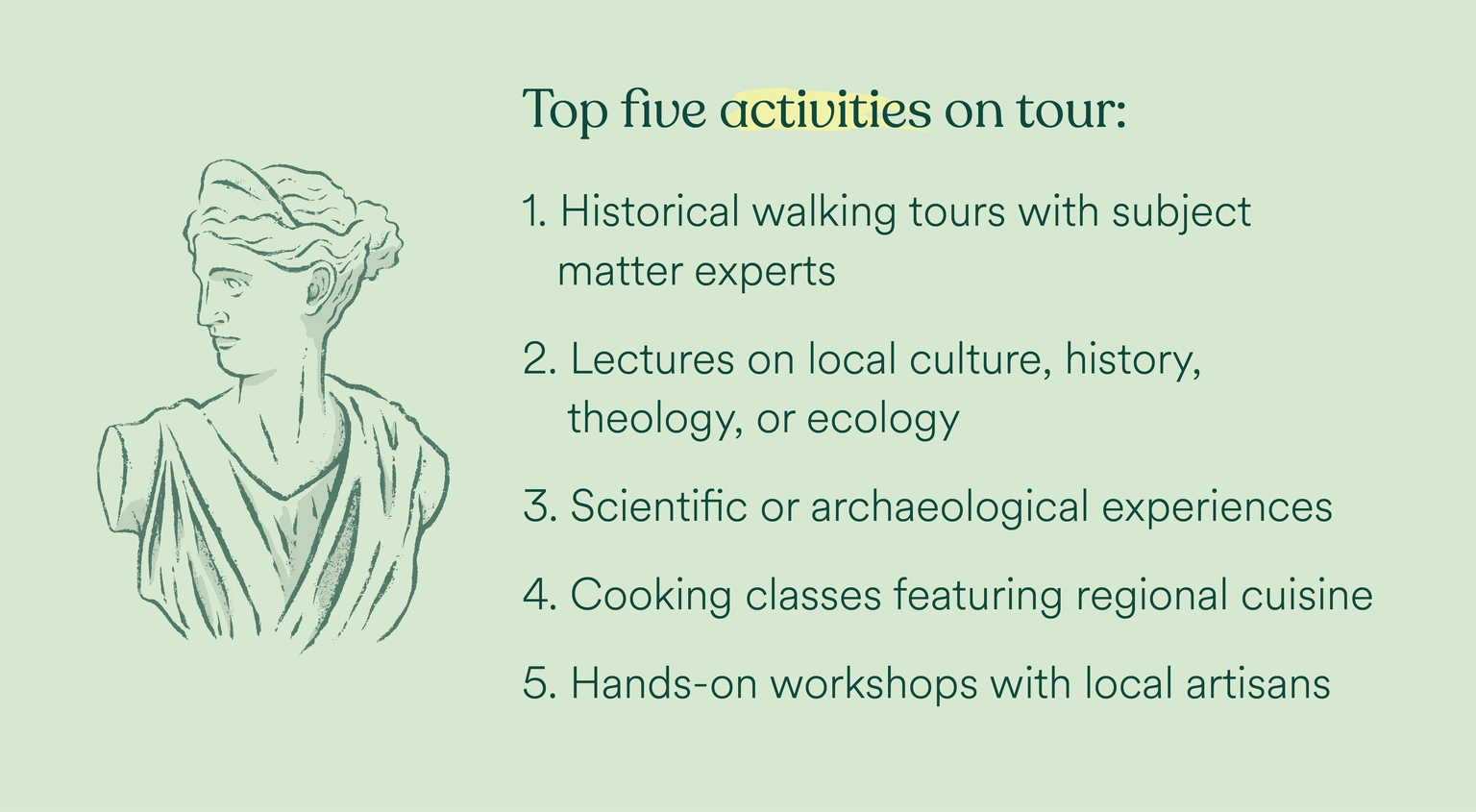
Honorable mentions to the nearly two in 10 travelers who said “language immersion” opportunities and “artistic pursuits like painting, photography, and writing” were favorite ways to learn about a local culture.
But it isn’t all about learning: 60% of travelers said they want moderate-to-half of their time spent on educational pursuits mixed with leisure activities while on tour.
Final thoughts
Despite a challenging economy and even more polarization in our public square, the future of travel is being written by those who’ve learned to balance wanderlust with wisdom, a hunger for travel with the economic realities of our day.
This determined demographic isn’t just traveling; they’re traveling with purpose. They’re climate-conscious, value-driven, and focused on how travel can be a part of their love of lifelong learning. They represent a sophisticated market of connection seekers and community builders that rewards authenticity and flexibility. And they are taking three steps forward to travel to and learn about a world that might currently be knocking them back a step or two along the way. But we are making progress together.
Tour operators like EF Go Ahead Tours continue to play an important role in helping more travelers responsibly and affordably see the world. Half of travelers we surveyed (50%) told us that authentic local experiences were the reason they valued guided tours so much.
And we aim to deliver, helping more travelers go guided along the way.
Methodology and media contacts
This traveler sentiment survey was sponsored by EF Go Ahead Tours and questions were co-developed and directly fielded by Qualtrics Research. A representative sample size of more than 1,000 United States and Canadian respondents, ages 35+ years old, participated in the survey in May 2025. Booking data is specific to tour bookings via travelers who are customers of EF Go Ahead Tours.
For media, researchers or other interested parties interested in learning more about this study, please reach email Brian Hoyt, EF World Journeys, brian.hoyt@ef.com or Marina Goodwin, EF Go Ahead Tours, marina.goodwin@ef.com.



